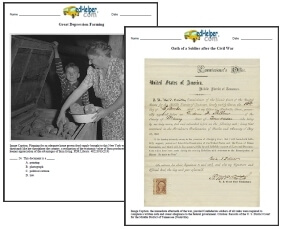
Worksheets and No Prep Teaching Resources
Reading Comprehension Worksheets
American Revolution

American Revolution
 Worksheets and No Prep Teaching Resources Reading Comprehension Worksheets American Revolution |
 American Revolution |
| edHelper's suggested reading level: | grades 6 to 8 | |
| Flesch-Kincaid grade level: | 6.35 |
|
Lexington and Concord
By Jane Runyon |

|
 |
Create Weekly Reading Books
Prepare for an entire week at once! |
| Leave your feedback on Lexington and Concord (use this link if you found an error in the story) |
 |
American Revolution
|
 |
United States
|
|
|
 | Fifty States Theme Unit |
 |
Document Based Activities |